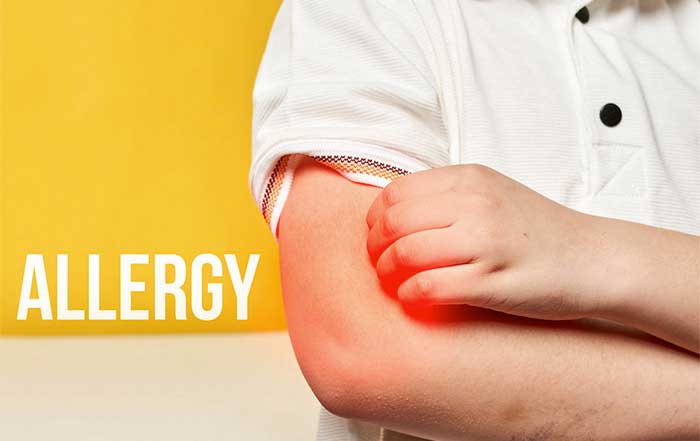Eczema symptoms vary from one sufferer to the other, but, in general, this skin condition manifests itself in the irritation of the outer layer of the skin.
What is Eczema?
The British Skin Foundation defines atopic eczema as “an inflammatory condition of the skin. Atopic is the term used to describe conditions such as eczema, asthma, seasonal rhinitis and hay fever, which often have a genetic basis. Eczema is the term used to describe changes in the upper layer of the skin that include redness, blistering, oozing, crusting, scaling, thickening and sometimes pigmentation (although not all of these changes will necessarily occur together).”
Dr Walayat Hussain, consultant dermatologist of Bupa Health Clinics, told Marie Claire UK, ‘Also referred to as “dermatitis”, eczema is a chronic inflammatory skin condition that can make your skin red, dry and itchy,’ says Dr Hussain. ‘There are a number of different types, and the type you have determines which treatment options are best for you.’
If your skin gets easily irritated, itchy, you get rashes and it is so dry to the point that it cracks and bleeds, then it all points to eczema. The next step from here is to consult a medical specialist so they can confirm the diagnosis and prescribe the right treatment for your particular condition.
As atopic eczema affects the outer layer of the skin, it can appear anywhere on the body, from hands, arms, feet, legs, arms, torso, and even your face.
Types of eczema
Although atopic eczema is the most common one, there are as many types of eczemas as skin types and they all stem from different and they require their own customised treatment.
Seborrhoeic eczema is a kind a skin inflammation visible as yellowish, oily, scaly patches of skin that appear most commonly on the face and scalp but it can also affect other parts of the body.
Contact eczema (also known as contact dermatitis) is manifested as redness, itching and burning that appear upon the skin getting in contact with an allergen such as an acid or cleaning agent. Unlike other allergies that manifest themselves after exposure, contact eczema is developed over time; your skin becomes sensitive to an allergen. This type of eczema usually manifested on your hands, so try to pay attention to what it is that is causing that reaction and avoid it at all costs. Also see your General Practitioner so he can refer you to a Dermatologist who will be perform an allergy test to determine what is affecting your skin.
Dishydrotic eczema (also known as pompholyx) shows as tiny, fluid-filled blisters on your hands and feet. These blisters are extremely itchy and they might burst during the healing process, becoming more sore.
Atopic eczema is often found in people who also suffer from asthma, hayfever and allergies. ‘This can be genetic and you may notice your skin gets irritated on the face, in front of the elbows and behind the knees,’ Dr Hussain told Marie Claire. ‘It usually flares up if you have allergies and come into contact with soaps, detergents or other types of chemicals.
‘Although there is no cure for atopic eczema, your GP or dermatologist may prescribe you with a specific type of moisturiser known as an emollient. These work by restoring water and oils to your skin to soothe and hydrate it, as well as helping to repair the damaged skin.’
Treating atopic eczema
Although there is no permanent cure for atopic eczema, adequate treatment can help to relieve the symptoms and many cases improve over time. These treatments include self care techniques, such as reducing scratching and avoiding triggers emollients and moisturising treatments). You can also use topical corticosteroids to minimise swelling, redness and itching during flare-ups. Topical steroid creams, such as hydrocortisone, eumovate and betnovate, help with the itching, as they keep the cells from producing chemicals that flare up the skin as a reaction to the allergen.
Diet and eczema
What you eat can affect your skin condition since you might have an allergic reaction to it. “Although changes in your diet can’t cure your eczema, in some case it may help alleviate the symptoms and minimise flare ups,” Dr Hussain told Marie Claire. This is because some types of eczema are rooted in allergic reactions, and allergy to food is the most common type of allergy.

